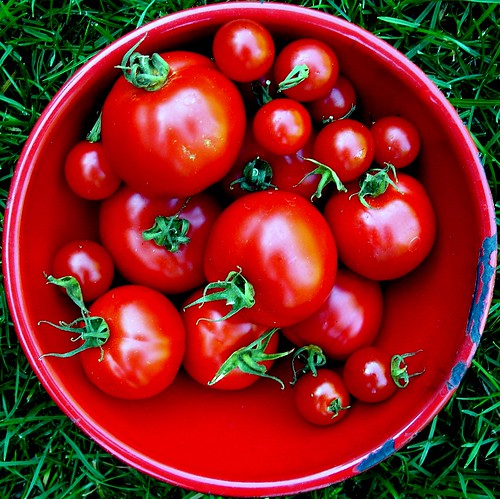 So last night, I went to an amazing dinner and talk featuring Fallen Fruit, an organization that you all should learn about. More on that later though (UPDATE!); let's focus on a detail. As Matias Viegener, one of the Fallen Fruit guys, spoke about the many varieties of tomato we were about to chow down on, he mentioned that one was called Love Apples.
So last night, I went to an amazing dinner and talk featuring Fallen Fruit, an organization that you all should learn about. More on that later though (UPDATE!); let's focus on a detail. As Matias Viegener, one of the Fallen Fruit guys, spoke about the many varieties of tomato we were about to chow down on, he mentioned that one was called Love Apples.(I should note that nothing from this point on is fact: for one, I feel like pretty much all etymology is speculation -- it's very rare you find consensus on a word's origin, and for another, I'm completely spazzy on the details here. The word origin stories are still lovely though, even if they're just true-ish.)
Anyway, apparently, this is what tomatoes were called when they were introduced to the English language: love apples. Why, you ask? Because, well, the Brits first learned about tomatoes from the Italians, who of course call them pomodoro, and mistakenly thought the word was derived from adorare. Actually though, the word more likely derives from d'oro, as in "golden apple" (a sweet reminder that red is just one of the many colors tomatoes can be), or de Moro, "apple of the Moors". Either way, I had never made the apple-tomato connection within pomodoro; I think it's pretty cool.
(Now that I think about it, one day we should talk about the apple-potato connection, which oddly/awesomely comes up in quite a few seemingly unrelated languages. People, get excited.)
[thanks to jackie-dee for the gorgeous tomato photo]

Ooo! Etymology is irresistibly exciting for me. I really could go on and on talking about one word and how it relates to another in a different language, which relates to another, and another, and so on...BUT I'm no professional, so it would really just be me getting excited about language.
ReplyDeleteHowever, since I can't resist...my current favorites are the Spanish words "almohada" (pillow) and "alfombra" (carpet) – along with various others – which use the "al" beginning common in Arabic. Yay!
I just noticed your entire chain of etymology posts. I guess I'm a little late on the arabic-spanish topic.
ReplyDeleteoh yay, volare, a kindred spirit! i am obsessed with this language game, and can play forever. i'm lucky to have a friend who speaks arabic fluently, so i think she and i have exhausted the arabic-persian connection. but the spanish-arabic ones are super fun as well! even guadalajara is from wadi-al-somethingorother... aaah, i love it!!!!
ReplyDeleteHebrew also has a "golden apple" -- tapuach zahav, usually abbreviated to tapuz -- but it refers to the orange, not the tomato.
ReplyDeleteAnd hebrew also the apple-potato connection since potato is tapuach adama or "earth apple." Much like pomme de terre in french.
But I don't think the apple-potato connection is an actual connection. Apparently "apple" used to be a generic word for "fruit" in many languages. So the potato is simply the "fruit of the earth."
az, every time i'm reminded of tapuach zahav, i'm re-surprised that the hebrew word for orange is neither some variation on orange/naranja/etc, or some variation on the word 'portugal' (as it is in Persian and (Egyptian?) arabic.
ReplyDeleteand as far as the apple/fruit thing, good one. i will try to remember it.